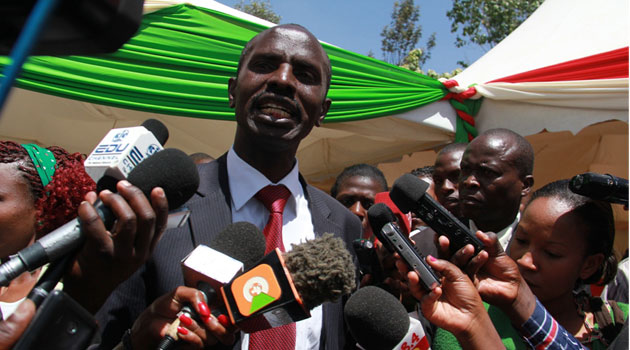
Sossion indicated that many institutions employ teachers who have not been registered by the Teachers Service Commission (TSC) thus lowering the standard of education/FILE
Through a joint statement read by Kenya National Union of Teachers (KNUT) Secretary General Wilson Sossion, they indicated that many private schools focus more on profit making as opposed to teaching.
Sossion indicated that many institutions employ teachers who have not been registered by the Teachers Service Commission (TSC) thus lowering the standard of education.
He urged the government to seal legislative and regulatory loopholes to ensure all schools in the country adhere to the minimum set standards including the hiring of qualified teachers.
“There is need to close existing legislative and regulatory loopholes and ensure compliance in relations to the minimum national standards with respect to the provision of education. Registration of schools must be conditional on full compliance with the minimum standards,” he said.
Other stakeholders who echoed his sentiments included The Kenya Union of Post Primary Education Teachers (KUPPET), the Universities Academic Staff Union (UASU), Transparency International (TI) and Action Aid Kenya.
The KNUT SG also observed that there is growing privatization of ‘education and fee charging for profit schools’ in Kenya and gave the example of Bridge International Academies.
He stated that in November 2015, the United Nations Committee on Economic, Social and Cultural Rights (UNCESCR) asked how the state has regulated and monitored informal private schools, or low cost private schools to ensure quality education.
He further said that a similar question had been asked by the African Commission on Human Rights who asked why private schools are registered as non-formal schools whereas they appear to offer formal education.
He pointed out that the crackdown will enable the government fulfil its primary obligation to properly and adequately fund free quality education for all.
“The government should fulfil its obligations consistent with the United Nations Sustainable Development Goal number four. Governments have committed to ensure inclusive and equitable quality education and promote lifelong learning for all,” Sossion stated.
He observed that target 4 (1) of the SDGs requires governments to ensure that all girls and boys complete free equitable and quality Primary and Secondary education leading to relevant and effective learning outcomes.
“Kenya has the best opportunity to lead the rest of the Nations in implementing SDG goals in its entirety because the legal framework is already in place,” he said.
He pointed out that the government should fulfil its Primary obligation to properly and adequately fund free quality education for all children regardless of the background.
“This is crucial to Kenya’s future and this is about employment of enough teachers so that we do not talk about some teachers being recruited in the rural areas and underpaid,” he stated.
He further stressed that according to Article 53 of the Constitution, every child has the immediate right to free and compulsory Basic Education.
“This is emphasized in section 28 of the Basic education Act 2013 and Section 7 of the Children’s Act 2001,” he said.









































